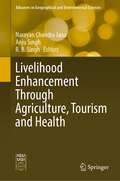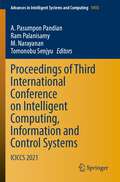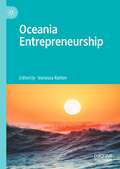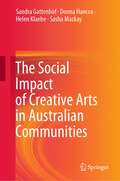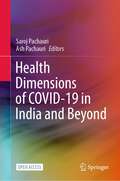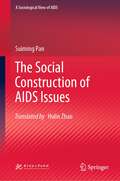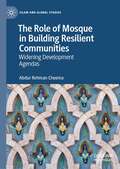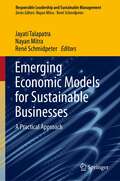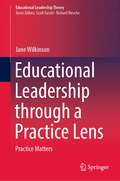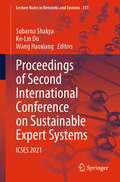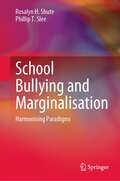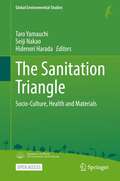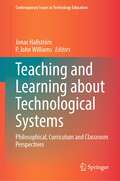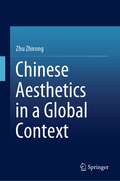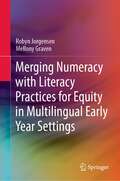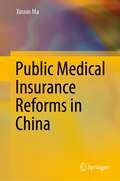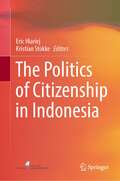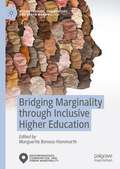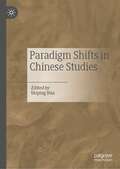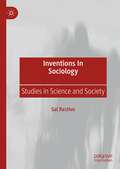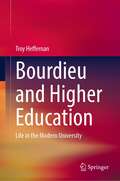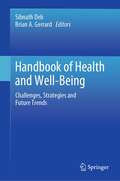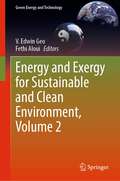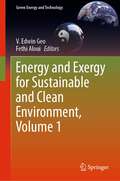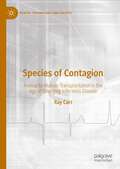- Table View
- List View
Livelihood Enhancement Through Agriculture, Tourism and Health (Advances in Geographical and Environmental Sciences)
by R. B. Singh Narayan Chandra Jana Anju SinghAgriculture is the backbone of our economic system. It provides not only food and raw material but also employment opportunities to a very large number of people. Higher atmospheric temperature has an impact on crop yields while the changes in rainfall could affect both crop quality and quantity. Climate change, therefore, could increase the prices of major crops in some regions. For the most vulnerable people, lower agricultural output means lower income. In addition, climate change is expected to increase the risk of illness and death from extreme heat and poor air quality. Recent evidence is the COVID-19 pandemic. Furthermore, climate change also affects the occurrence of other infectious diseases. A number of well-known diseases are climate-sensitive - malaria, dengue fever, and cholera among others. Tourism is considered as an industry and alternative contributor to a nation’s income. It can generate employment opportunities and boost up the economy. This book, consisting of 26 chapters, focuses on the issues of agriculture, tourism and health for livelihood enhancement. It is essential to discuss these diverse issues in the field of geography as it encompasses interdisciplinary topics. The range of concerns at the national, regional and local levels is not confined to geography only but also involves other disciplines as well. Therefore, this book is a valuable source for scientists and researchers in allied fields such as livelihood, agriculture, land use, tourism management, health care and tribal studies. Furthermore, this book can be of immense help to the researchers, planners and decision makers engaged in solving problems in these areas in developing countries and beyond.
Proceedings of Third International Conference on Intelligent Computing, Information and Control Systems: ICICCS 2021 (Advances in Intelligent Systems and Computing #1415)
by A. Pasumpon Pandian Tomonobu Senjyu Ram Palanisamy M. NarayananThis book is a collection of papers presented at the International Conference on Intelligent Computing, Information and Control Systems (ICICCS 2021). It encompasses various research works that help to develop and advance the next-generation intelligent computing and control systems. The book integrates the computational intelligence and intelligent control systems to provide a powerful methodology for a wide range of data analytics issues in industries and societal applications. The book also presents the new algorithms and methodologies for promoting advances in common intelligent computing and control methodologies including evolutionary computation, artificial life, virtual infrastructures, fuzzy logic, artificial immune systems, neural networks and various neuro-hybrid methodologies. This book is pragmatic for researchers, academicians and students dealing with mathematically intransigent problems.
Oceania Entrepreneurship
by Vanessa RattenThis book focuses on the growth of entrepreneurship in Oceania. This means focusing on cultural endeavors as well as digital and technology-based forms of entrepreneurship. It is the first to explore how Oceania has a distinctive type of business appeal given its strategic position in the world. Whilst other regions such as North America, Europe and Africa have been studied in terms of entrepreneurial endeavors, there is a lack of research on Oceania despite it being a unique and important region. This book thus fills this gap by taking a progressive approach as to how entrepreneurship in Oceania is managed, emphasizing the growth of new economic segments and changing geo-political powers.
The Social Impact of Creative Arts in Australian Communities
by Sandra Gattenhof Donna Hancox Helen Klaebe Sasha MackayThis book brings together discussions about Australian arts policy and funding, outcomes of arts engagement in terms of social inclusion, well-being and education. It presents exemplars of creative programs or case studies that build capacity and lasting impact for communities in urban and regional Australia. This book describes the impact of the arts using narrative case studies. Through this, it develops conceptual understanding and frameworks that can be used to dynamically assess the value and impact of arts engagement across the three types of cultural value: intrinsic value, instrumental value and institutional value. It focuses on how arts engagement creates, supports and extends factors such as well-being, social inclusion and educational achievement. This book provides an innovative examination of the evidence from Australian projects depicting the impact of the arts on a range of indicators and sectors.
Health Dimensions of COVID-19 in India and Beyond
by Saroj Pachauri Ash PachauriThis open access book addresses the multiple health dimensions posed by the COVID-19 pandemic in India and other countries including nine in Asia, five in Sub-Saharan Africa, and New Zealand. It explores the impact of the pandemic on mental health, sexual and reproductive health and rights, health financing, self-care, and vaccine development and distribution. The contributing authors discuss its impact on vulnerable populations, including interstate migrants and female sex workers. The significant role of media and communications, rapid dissemination of information in social media, and its impact during the COVID-19 pandemic era are discussed. It closes with lessons learned from the experiences of countries that have contained the pandemic. With contributions from experts from around the world, this book presents solutions of problems that relate to COVID-19. It is a valuable resource appealing to a wide readership across the social sciences and the humanities. Readers include governments, academicians, researchers, policy-makers, program implementers, as well as lay persons.
The Social Construction of AIDS Issues (A Sociological View of AIDS)
by Suiming PanThis book explores AIDS from a relatively macro perspective rather than concrete operational methods and focuses on the social construction of AIDS issues instead of its transmission level in the context of China. First, it begins with the theoretical analysis and the social significance of AIDS, which is different from the simple conflict between different schools of thought. Second, it analyses the contest of various social powers in the process of AIDS construction and conclusion, rather than making different explanations of policies. Last but not least, it elaborates on the central proposition, i.e., the “AIDS issue” is a symbol of China’s social restructuring process. Only in an effort to advance such a process can we be more likely to find the best problem-solving mode, rather than clamouring repeatedly or giving countermeasures alone.
The Role of Mosque in Building Resilient Communities: Widening Development Agendas (Islam and Global Studies)
by Abdur Rehman CheemaThis book is about the role of the mosque in the aftermath of the 2005 earthquake in Pakistan. Disasters give rise to a situation where people from different parts of the world, quite unfamiliar with each other, come into contact to save lives, provide necessities such as food and shelter, rebuild homes and enable community recovery. During these challenging times, community-based religious institutions such as churches, mosques and temples are a practical choice for reaching people living nearby to fulfil their needs. The book shows the contributions of the mosque as a physical, spiritual and social place for improving the knowledge and practice of disaster risk reduction and management including the COVID-19 pandemic. It also illuminates the widening role of religion in development. The book reinforces the case for broader engagement with all community-based religious institutions. The book is of interest to academics in diverse fields including development studies, disaster studies, sociology, anthropology, religion, Asian studies, emergency and disaster management. It will also of interest to the professional staff of disaster management authorities, public sector, bilateral and multilateral aid allocation and implementing agencies and those of humanitarian organizations.
Emerging Economic Models for Sustainable Businesses: A Practical Approach (Responsible Leadership and Sustainable Management)
by René Schmidpeter Nayan Mitra Jayati TalapatraThe book discusses new and emerging economic models, that respond to 'Pulling' and 'Pushing' forces. Today we are poised at an interesting juncture, with favourable conditions making it easier to be a sustainable organization acting as a ‘Pulling’ Force and the climate crisis, rise in social-economic equities thereby ‘Pushing’ for urgent action. The book analyses economic models that look at value propositions, creation and capture with ‘People, Planet and Profit’ deeply embedded in each stage of the value chain. The contributions bring out the interplay between new standards, evaluation frameworks, technology innovation and other emerging tools to show how they create a sustainable business. For this, they lean on learnings from successful sustainable businesses. Business leaders will find that this book provides deep insights on improving their existing sustainable practices, and speeding up the transition from linear to circular, narrow stakeholder driven to community driven. For prospective entrepreneurs the book provides the nudge needed to start up a sustainable enterprise. Students and researchers can benefit from real-life examples of how sustainable transformations unfold.The book thus creates an easy guide for those willing to make the transition to sustainability, start a sustainable business and most of all, to motivate those who may not yet be convinced about the long-term sense of taking care of our people and our earth.
Educational Leadership through a Practice Lens: Practice Matters (Educational Leadership Theory)
by Jane WilkinsonThis book provides the theoretical and analytical resources for an urgent rethinking of the social project of educating and educational leading. It examines what educational leadership is, namely the politics and power of leadership as a practice, and what it can and should be, offering a pedagogical and praxis-informed approach to educational practice. Drawing on research conducted at various Australian schools and education districts, it argues for a reframing of educational leadership as pedagogical practice/praxis to transform theorising and practice in the field. The book provides a rich account of educational leading through a practice lens, bringing into dialogue the theory of practice architectures with site ontologies, Bourdieu’s thinking tools and feminist critical scholarship.The book tracks the practices and praxis of educational leaders as they grapple with the changing landscape and forces of educational policies that have informed Australian education. It reimagines education leadership by integrating Continental and Northern European understandings of pedagogy and praxis as being morally and ethically informed, as opposed to the narrower Anglophone notions of pedagogy as teaching and learning. The book adds to the body of knowledge on the “actual work of leadership” as a “distinct set of practices” that is morally and ethically informed. Readers will find a more holistic understanding of educational leadership practice and praxis, based on the everyday accounts of educational leaders, teachers and students in schools and education districts.
Proceedings of Second International Conference on Sustainable Expert Systems: ICSES 2021 (Lecture Notes in Networks and Systems #351)
by Ke-Lin Du Subarna Shakya Wang HaoxiangThis book features high-quality research papers presented at the 2nd International Conference on Sustainable Expert Systems (ICSES 2021), held in Nepal during September 17–18, 2021. The book focusses on the research information related to artificial intelligence, sustainability, and expert systems applied in almost all the areas of industries, government sectors, and educational institutions worldwide. The main thrust of the book is to publish the conference papers that deal with the design, implementation, development, testing, and management of intelligent and sustainable expert systems and also to provide both theoretical and practical guidelines for the deployment of these systems.
School Bullying and Marginalisation: Harmonising Paradigms
by Phillip T. Slee Rosalyn H. ShuteThis book addresses, and seeks to harmonise, different paradigms for understanding school bullying. It sets out to examine two paradigms for conceptualising bullying, and the worldviews that underpin them. It uses a complex systems perspective to bring the two paradigms together in a holistic fashion. By doing so, it creates an integrated framework for conceptualising the many individual, relational and societal factors that are in dynamic interaction and play a part in promoting or reducing school bullying. This book draws upon a number of disciplines by way of background, including evolutionary, child development and social psychological theories of group behaviour and identity. It proposes that the human need for belonging is central to understanding bullying, and situates the topic within an understanding of gender and children’s human rights, bringing philosophical and moral perspectives to bear. It discusses practical ways forward, presents a systemic approach to bullying and application of complex adaptive systems methods to bullying research and evaluation. It serves as an introduction to such methods and suggests further creative ideas for policy, intervention practice, and teacher education about bullying.
The Sanitation Triangle: Socio-Culture, Health and Materials (Global Environmental Studies)
by Taro Yamauchi Seiji Nakao Hidenori HaradaThis open access book deals with global sanitation, where SDG 6.2 sets a target of enabling access to sanitation services for all, but has not yet been achieved in low- and middle-income countries. The transition from the United Nations MDGs to the SDGs requires more consideration based on the socio-cultural aspects of global sanitation. In other words, equitable sanitation for those in vulnerable situations could be based on socio-cultural contexts. Sanitation is a system that comprises not only a latrine but also the works for the treatment and disposal of human waste. Sanitation systems do not function by themselves but have significance only through social management. The process of decision-making also largely depends on socio-cultural conditions, and the importance of sanitation needs to be socially acknowledged. The health benefits of sanitation improvement—among the significant contributions of sanitation—also need to be considered in the socio-cultural milieu. Further, the social-culture itself is affected, and potentially even created, by sanitation. In this context, more progress on the improvement of sanitation requires a more holistic approach across disciplines.In this book, we present the concept of the Sanitation Triangle, which considers the interconnections of health, materials, and socio-culture in sanitation, as a holistic approach, and the case studies based on the Sanitation Triangle by diverse disciplines such as Cultural Anthropology, Development Studies, Health Sciences, Engineering, and Science Communication. By the deep theoretical examinations and inter-dialogues between the different disciplines, this book explores the potentialities of inter-disciplinary studies on global sanitation.
Teaching and Learning about Technological Systems: Philosophical, Curriculum and Classroom Perspectives (Contemporary Issues in Technology Education)
by P. John Williams Jonas HallströmThis book discusses the teaching and learning about technological systems in technology education and adjacent curriculum areas. It describes, analyzes and synthesizes contemporary research on technological systems in technology education. By delving into the philosophy, sociology and history of technology, technology education and the learning and teaching of technological systems, it summarizes prior research and analyzes new research. This book thereby serves as a resource and reference work for professionals in this area of research and education.
Chinese Aesthetics in a Global Context
by Zhirong ZhuThis book examines aesthetic issues based on humanities principles and creates a theory of Chinese aesthetics from a global perspective by applying China’s traditional and cultural history to a Western theoretical framework. In particular, this book emphasizes the shared features of Confucianism, Daoism, and Buddhism, namely the unity of heaven and men, unity of nature and society, and the materialization of human feelings and humanization of material things. It also highlights the dominant role of humans in the aesthetic relationship between human and object, while placing imagery in a focal position.
Merging Numeracy with Literacy Practices for Equity in Multilingual Early Year Settings
by Robyn Jorgensen Mellony GravenThis book draws on both in and out of school literacy practices with teachers and families to enhance the numeracy of early learners. It provides highly illustrative exemplars, targeted for learners up to approximately eight years of age whose home language differs from the language of instruction. It identifies the challenges faced by these learners and their families, and shares ways of building both literacy and numeracy skills for some of the vulnerable learners nationally and internationally.The book shares the outcomes and strategies for teaching mathematics to early years learners and highlights the importance of literacy practices for learners for whom the language of instruction is different from their home language. Readers will gain a practical sense of how to create contexts, classrooms and practices to scaffold these learners to build robust understandings of mathematics.
Public Medical Insurance Reforms in China
by Xinxin MaThis book investigates public medical insurance reform in China and studies its effects from both institutional and empirical study perspectives. It provides the reader with academic evidence for understanding the transformation of public medical insurance and its effect on the utilization of healthcare services, expenditure for medical care, individuals’ financial portfolio allocation, and well-being. The main content of the book comprises two parts. First, institutional transformations of public medical insurance are considered: medical insurance reform in rural and urban China, and problems of medical insurance reform in the country. Second, it looks at the impact of public medical insurance reforms in China: evidence-based on empirical studies, including determinants of participation in medical insurance, the New Rural Cooperative Medical Scheme and its effects on the utilization of healthcare services, medical insurance and its effects on out-of-pocket expenditure, risky financial market participation, and well-being in China. This study provides academic evidence about these issues based on economic theories and econometric methods using many kinds of nationwide Chinese representative survey data. The book is highly recommended to readers who are interested in up-to-date and in-depth empirical studies on the mechanisms of participation in medical insurance and the impact of public medical insurance reforms on individuals and household behaviors in China. This volume will be of interest to those who are interested in the Chinese economy, social security policymakers, and scholars with an econometric analysis background.
The Politics of Citizenship in Indonesia
by Kristian Stokke Eric HiariejThis book highlights the gains that a citizenship approach offers to the study of democracy in Indonesia, demonstrating that the struggle for citizenship and the historical development of democracy in the country are closely interwoven. The book arises from a research agenda aiming to help Indonesia’s democracy activists by unpacking citizenship as it is produced and practiced through movements against injustice, taking the shape of struggles by people at grassroots levels for cultural recognition, social and economic injustice, and popular representation. Such struggles in Indonesia have engaged with the state through both discursive and non-discursive processes. The authors show that while the state is the common focal point, these struggles are fragmented across different sectors and subject positions. The authors thus propose that developing chains of solidarity is highly important to motivating a democracy that not only has sovereign control over public affairs, but also robust channels and organisations for political representation. In advocating the development of transformative agendas, organisations, and strategies as an important need, and an enduring challenge, for the realization of citizenship, this book is timely and relevant to the study of contemporary Indonesia's socio-political landscape. It is relevant to students and scholars in political science, anthropology, sociology, human geography and development studies.
Bridging Marginality through Inclusive Higher Education (Neighborhoods, Communities, and Urban Marginality)
by Marguerite Bonous-HammarthThis book examines the changing influences of diversity in American higher education. The volume offers evidence and recommendations to positively shape inclusive learning and engagement of students, faculty, staff and community across the complex terrains of urban, suburban, and rural organizations within higher education today. Chapters highlight critical collaborations across student affairs and academic affairs, and delve into milestones addressing access, retention, engagement, and thriving within distinctive institutional types (e.g., research, liberal arts, community colleges, Minority Serving Institutions). Authors also explore the nuanced changes occurring against the contemporary backdrop of COVID-19 experiences – including the rise of anti-Asian racism, the salience of implicit biases, and the disparate access to and impacts of health services. Essential chapters refocus our consideration about the trajectories of historically underrepresented groups and their peers (including, African Americans, Hispanic/Latino, Indigenous people, individuals with disabilities and those identifying as LGBTQ+, undocumented students, and women) in American higher education.
Paradigm Shifts in Chinese Studies
by Shiping HuaThis book is a study of the change and continuity in paradigms in China studies, both inside and outside of China. In the last few years, the United States and China appeared to be moving in the direction of “de-coupling,” indicating that the engagement policy with China in the last four decade is ending. The “modernization theory” that is the theoretical foundation of the engagement policy has proved to be insufficient. This situation calls for a reexamination of the field of China studies. Historically, scholarly paradigms shifts often went hand in hand with drastic social change. As we have entered an era of great uncertainty, it is constructive to reflect on the paradigms in China studies in the past and explore the possibility of new paradigms in the future. How are the shifts of major theories, methods and paradigms in China studies in the west related to social change? How did some of China’s paradigms impact on the country’s social change and developments?This book will appeal to a wide readership, including scholars and graduate students, upper division undergraduate students of China studies, Asian studies.
Inventions in Sociology: Studies in Science and Society
by Sal RestivoThis book presents a collection of old and new essays exploring the author’s unique contributions to the sociology of science, mathematics, logic, robotics, brain, and god. Known for his defense of a strong social constructionist approach to the hard problems in the sociology of science, the power and range of Restivo’s interests and studies are discussed in this unique text. The essays range from his introduction of the sociology of objectivity early in his career to his recent construction of a social brain paradigm. The author situates himself in the context of the leading paradigms in science studies and his relationships with leading figures in the field including Latour, Woolgar, Needham, and D.T. Campbell. The book demonstrates a general theoretical focus on the rejection of transcendence. He rejects Platonism in mathematics and socially situates consciousness, genius, and God. The author’s wide ranging interdisciplinary competencies reflect classical and postmodern influences and will be an invaluable reference for researchers working in this field.
Bourdieu and Higher Education: Life in the Modern University
by Troy HeffernanThis book introduces Bourdieu in the context of higher education for unfamiliar readers or those who would like to see his theories applied in the higher education setting. It builds upon research into higher education leadership and administration to examine how the university sector has changed over recent decades and how it has been reshaped into its current form.The book draws together various aspects of higher education influenced by the mass-market higher education system to examine how these forces have affected each other positively and negatively and demonstrate the culminating impact of these forces on the sector. It also focuses on the realities of what drives work and life in the modern university. It traces the steps the sector has taken in some areas to address equity issues by increasing diversity and inclusion and highlights the systemic issues that persist.
Handbook of Health and Well-Being: Challenges, Strategies and Future Trends
by Sibnath Deb Brian A. GerrardThis evidence-based book focuses on contemporary issues related to human health and well-being. Drawing on the first-hand experiences of academics and researchers, it provides a holistic perspective on the importance of both mental and physical health for quality of life. It is divided into seven sections: changing perspectives on well-being; the mental health of students; the well-being of elderly people and marginalized populations; the role of family and teachers; psycho-social support; the right to health; and future perspectives. Covering current topics, such as the challenges posed by pandemics like COVID-19, the book discusses future strategies for addressing contemporary and emerging health issues and the overall well-being of the general public, an area not covered in any of the previous volumes. Furthermore, it explores the need for the involvement of multidisciplinary professionals in examining general health and well-being issues. Given its scope, it is an indispensable resource for a wide range of professionals and researchers from various fields, such as the social sciences, law, public health, medicine, education, and environmental studies. In addition, the book appeals to health policymakers, educational administrators, law enforcement agencies, as well as health workers, psychologists, and social workers dealing with clients in hospitals, educational institutions, and at the community level.
Energy and Exergy for Sustainable and Clean Environment, Volume 2 (Green Energy and Technology)
by V. Edwin Geo Fethi AlouiThis multi-disciplinary book presents the most recent advances in exergy, energy, and environmental issues. Volume 2 focuses on fundamentals in the field and covers current problems, future needs, and prospects in the area of energy and environment from researchers worldwide. Based on some selected lectures from the Eleventh International Exergy, Energy and Environmental Symposium (IEEES-11) and complemented by further invited contributions, this comprehensive set of contributions promote the exchange of new ideas and techniques in energy conversion and conservation in order to exchange best practices in "energetic efficiency." Included are fundamental and historical coverage of the green transportation and sustainable mobility sectors, especially regarding the development of sustainable technologies for thermal comforts and green transportation vehicles. Furthermore, contributions on renewable and sustainable energy sources, strategies for energy production, and the carbon-free society constitute an important part of this book.
Energy and Exergy for Sustainable and Clean Environment, Volume 1 (Green Energy and Technology)
by V. Edwin Geo Fethi AlouiThis multi-disciplinary book presents the most recent advances in exergy, energy, and environmental issues. Volume 1 focuses on fundamentals in the field and covers current problems, future needs, and prospects in the area of energy and environment from researchers worldwide. Based on some selected lectures from the Eleventh International Exergy, Energy and Environmental Symposium (IEEES-11) and complemented by further invited contributions, this comprehensive set of contributions promote the exchange of new ideas and techniques in energy conversion and conservation in order to exchange best practices in "energetic efficiency." Included are fundamental and historical coverage of the green transportation and sustainable mobility sectors, especially regarding the development of sustainable technologies for thermal comforts and green transportation vehicles. Furthermore, contributions on renewable and sustainable energy sources, strategies for energy production, and the carbon-free society constitute an important part of this book.
Species of Contagion: Animal-to-Human Transplantation in the Age of Emerging Infectious Disease (Health, Technology and Society)
by Ray CarrSpecies of Contagion examines the political and social implications of xenotransplantation for bodies, nations, and species. Scientists are demonstrating a renewed interest in developing transplants for humans with tissues from pigs, with the aid of genetic engineering techniques, immunosuppressant drugs, and novel cellular technologies. Yet, some argue that these transspecies promiscuities threaten to enable new viruses to emerge in human populations. Drawing on the later works of Foucault, this book analyses contemporary power relations in animal-to-human transplantation research, ranging across governmental regulation, scientific understandings of infectious disease, and animal ethics. While many xenotransplantation practices resonate with a security approach that renders uncertainty an inherent condition of life and encourages adaptation across species boundaries, government regulation and industry also reinscribe sovereign boundaries of bodies, species, and nations. Species of Contagion illustrates the variation in the cultural and scientific imaginaries that governments and industry bring to bear on the problematic of xenotransplantation.
